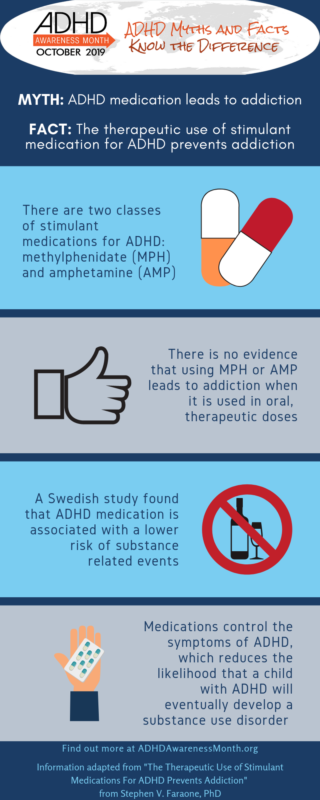FACT: The therapeutic use of stimulant medications for ADHD prevents addiction
There are two classes of stimulant medications for ADHD: methylphenidate (MPH) and amphetamine (AMP). Each of these medications is available in several long and short acting formulations, the availability of which differs among countries. Examples of MPH products are Ritalin, Concerta and Medikinet. Examples of AMP products are Lysdexamfetamine, Dyanavel XR and Evekeo.
The different formulations affect how the drug is delivered to the brain and are designed to modulate the speed of uptake and the length of time the drugs work during the day.
Despite these differences, medications in each class contain the same drug, either MPH or AMP. Both drugs are potentially addictive but their ability to cause addiction depends on how they are used.
Drug addicts enjoy drugs when they reach the brain quickly. For that reason, they prefer forms of MPH or AMP that can be injected or snorted (sniffed through the nose).
In the 1960s and 1970s, many animal model studies showed that MPH and AMP would cause addiction. This caused much concern until researchers realized that they had made a crucial error. They had injected large quantities of the drug into the animal (usually a rat or a mouse) rather than giving the drug orally in the way it is used therapeutically for ADHD.
When researchers at the University of California in San Diego gave these drugs orally with doses that were comparable to therapeutic doses, they found no evidence for addiction. That finding is now widely accepted.
Importantly, the finding is also consistent with the fact that physicians do not observe addiction among their patients with ADHD who use the drug in oral, therapeutic doses.
Concerns have also been raised about the non-medical use of stimulant medications, especially among young adult college students who will use these medications in the hopes that they will improve their studying ability (e.g. by staying up late) or for mixing with alcohol at parties to say awake. This is indeed a problem, but it is not related to the prescribed use of these medications by patients with ADHD. Nonetheless, it has contributed to the perception that these medications cause addiction.
About 15 years ago, I realized that the longitudinal studies of patients with ADHD (i.e. repeated observations of people over short or long periods of time) could help us better understand whether the prescribed use of stimulant medications caused addiction.
Stimulant medication in childhood does not lead to addictive disorders later
With my colleagues at Harvard Medical School and the Massachusetts General Hospital, I reviewed all available studies. We found no evidence that the use of stimulant medications for ADHD in childhood led to addictive disorders in adolescence or adulthood.
Instead, we found some evidence that the stimulant medications for ADHD protected patients from subsequent addictive disorders.
Additional evidence for a protective effect of stimulant medications came from a Swedish study of commercial health care claims from 2,993,887 adolescent and adult ADHD patients. The authors concluded:
These results provide evidence that receiving ADHD medication is unlikely to be associated with greater risk of substance-related problems in adolescence or adulthood. Rather, medication was associated with lower concurrent risk of substance-related events and, at least among men, lower long-term risk of future substance-related events.
This confirmed an earlier report from Sweden based on a study of 26,249 men and 12,504 women with ADHD.
So, the data are clear and unequivocal. When used therapeutically, the stimulant medications for ADHD do not cause addiction. Instead, because these medications control the symptoms of ADHD, they reduce the likelihood that a child with ADHD will, eventually, develop a substance use disorder.
ABOUT THE AUTHOR

Stephen Faraone, PhD, is a Distinguished Professor in the Departments of Psychiatry and Neuroscience & Physiology at SUNY Upstate Medical University, President of the World Federation of ADHD and Program Director for www.ADHDinAdults.com. His research studies of ADHD include epidemiology, neurobiology, and psychopharmacology.
Read more myths about living with ADHD
References
Kuczenski, R. & Segal, D. S. (2002). Exposure of adolescent rats to oral methylphenidate: preferential effects on extracellular norepinephrine and absence of sensitization and cross-sensitization to methamphetamine. J Neurosci 22, 7264-71.
Wilens, T., Faraone, S. V., Biederman, J. & Gunawardene, S. (2003). Does Stimulant Therapy of Attention Deficit Hyperactivity Disorder Beget Later Substance Abuse? A Meta-Analytic Review of the Literature. Pediatrics 111, 179-185.
Quinn, P. D., Chang, Z., Hur, K., Gibbons, R. D., Lahey, B. B., Rickert, M. E., Sjolander, A., Lichtenstein, P., Larsson, H. & D’Onofrio, B. M. (2017). ADHD Medication and Substance-Related Problems. Am J Psychiatry 174, 877-885.
Chang, Z., Lichtenstein, P., Halldner, L., D’Onofrio, B., Serlachius, E., Fazel, S., Langstrom, N. & Larsson, H. (2014). Stimulant ADHD medication and risk for substance abuse. J Child Psychol Psychiatry 55, 878-85.
Faraone, S. V., Rostain, A. L., Montano, C. B., Mason, O., Antshel, K. M. & Newcorn, J. H. (2019). Systematic Review: Nonmedical Use of Prescription Stimulants: Risk Factors, Outcomes, and Risk Reduction Strategies. J Am Acad Child Adolesc Psychiatry.

